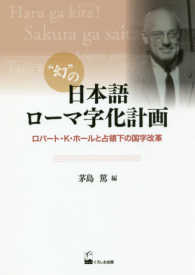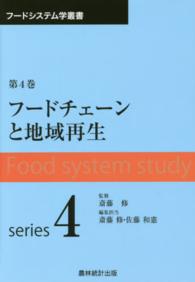- ホーム
- > 洋書
- > 英文書
- > History / World
Full Description
The Oxford Handbook of the Weimar Republic is a multi-author survey of German history from 1918 to 1933. Covering a broad range of topics in social, political, economic, and cultural history, it presents an overview of current scholarship, and will help students and teachers to make sense of the contradictions and complexities of Germany's experiments with democracy and modern society in this period. The contributions emphasize the historical openness of Germany's first republic, which was more than just the coming of the Third Reich. The thirty-three chapters, all written by leading experts, contain information and interpretation based on cutting-edge scholarship, and together provides an unsurpassed panorama of the Weimar Republic.
Contents
1: Nadine Rossol and Benjamin Ziemann: Introduction
Part I: Key Events and Political Developments
2: Christopher Dillon: The German Revolution of 1918/19
3: Martin H. Geyer: The Period of Inflation, 1919-1923
4: Matthew Stibbe: Coalition-Building and Political Fragmentation, 1924-1930
5: Larry Eugene Jones: From Democracy to Dictatorship: The Fall of Weimar and the Nazi Rise to Power, 1930-33
Part II: Polity, Politics, and Policies
6: Peter C. Caldwell: The Weimar Constitution
7: Erin Hochman: Nationalism and Nationhood
8: Thomas Mergel: Elections, Election Campaigns, and Democracy
9: Siegfried Weichlein: Federalism, Regionalism, and the Construction of Spaces
10: Benjamin Ziemann: The Reichswehr and Armament Policies
11: Jonathan Wright: Foreign Policy: The Dilemmas of a Revisionist State
12: Nadine Rossol: Republican Groups, Ideas, and Identities
13: Karl-Christian Führer: Social Policy in the Weimar Republic
Part III: Parties and their Constituencies
14: Philipp Müller: Liberalism
15: Joachim C. Häberlen: Social Democrats and Communists in Weimar Germany: A Divided Working-Class Movement
16: Shelley Baranowski: The Centre Party, Conservatives, and the Radical Right
17: Daniel Siemens: National Socialism
18: Susanne Wein and Martin Ulmer: Antisemitism in the Weimar Republic
Part IV: Economy and Society
19: Jan-Otmar Hesse and Christian Marx: The Overstretched Economy: Industry and Financial Services
20: Moritz Föllmer: The Middle Classes
21: Pamela Swett: The Industrial Working Class
22: Benjamin Ziemann: Agriculture and Rural Society
23: Ute Planert: Weimar Bodies: Gender, Sexuality, and Reproduction
24: Mary Nolan: Transnational Visions of Modernity: America and the Soviet Union
25: Sharon Gillerman: German Jews in the Weimar Republic
26: Barbara Stambolis: Youth and Youth Movements: Relations, Challenges, Developments
Part V: Culture
27: Jochen Hung: Mass Culture
28: Helmuth Kiesel: German Literature 1918-1933
29: Beate Störtkuhl: Architecture, Town Planning and Large-Scale Housing Estates: Challenges, Visions, and Proposed Solutions
30: Todd Weir and Udi Greenberg: Religious Cultures and Confessional Politics
31: Lutz Raphael: The Humanities and Social Sciences
32: Kerry Wallach: Visual Weimar: The Iconography of Social and Political Identities
33: Claudia Siebrecht: The Presence of the First World War in Weimar Culture
Index








